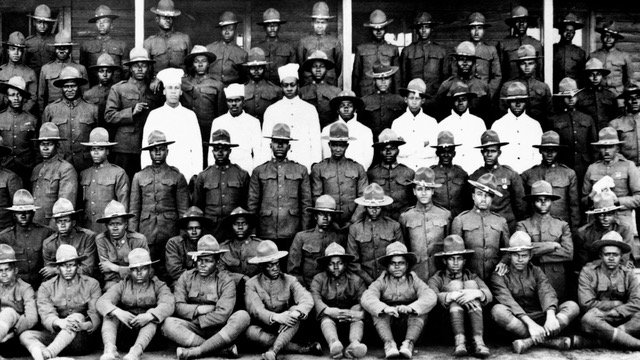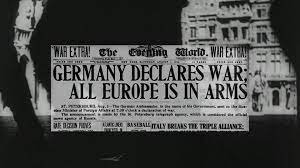A FIGHT FOR FREEDOM AND RESPECT AT HOME AND ABROAD: Black Soldiers in World War I
By GL Harris, Blogger-in-Residence
“One ever feels his two-ness,—an American, a Negro; two souls, two thoughts, two unreconciled strivings; two warring ideals in one dark body, whose dogged strength alone keeps it from being torn asunder.
The history of the American Negro is the history of this strife,—this longing to attain self-conscious manhood, to merge his double self into a better and truer self. In this merging he wishes neither of the older selves to be lost…He simply wishes to make it possible for a man to be both a Negro and an American, without being cursed and spit upon by his fellows, without having the doors of Opportunity closed roughly in his face.”
—W.E.B. Du Bois, The Souls of Black Folk, 1903. Chapter I. Of Our Spiritual Strivings.
The Great War, or the War to End All Wars, began and ended at the dawn of the 20th century. There were 70 million military personnel including 60 million Europeans. In four years, 1914-1918, some 8.5 million combatant deaths, with 13 million civilian deaths attributed to the war. The United States sent 4.8 million soldiers into the war to support British and French allies against Germany. And while African Americans represented 10% of the US population, they comprised 13% of the men sent to support the war effort. Nearly one half million black soldiers served their country in World War I.
The award-winning filmmaker Joanne Burke skillfully documents the range of hardships faced by black soldiers serving in the United States Army during WWI in her film, Fighting for Respect.
The black or Negro troops didn’t receive proper training, uniforms, equipment or barracks at southern training sites because their presence offended southern white officers and enlisted men.
Burke spent three years researching the film, locating in the Library of Congress and other sites hundreds of documents, photographs and moving images that were a treasure trove of rarely glimpsed archives.
“Reading everything I could get my hands on about WWI, and about African Americans in WWI, and going past the history books into the actual diaries, and into the work of scholars who had been working on this but hadn’t gotten any recognition,” Burke said, gave her the foundation she needed to provide an intimate and unflinching look at the high price black soldiers paid to serve their country and defend the freedom of men, women and children abroad.
“Africans and people of African descent have historically participated in wars on behalf of Western powers. Fighting for Respect is a film that clearly illustrates the aim of being respected and considered as full citizens in the US was not fully attained after AA participation in the WWI,” said Dr. Reinaldo Barroso-Spech, the African Diaspora International Film Festival co-founder and co-director.
While the documentary makes clear the horrors of the war and the indignities suffered by the black soldiers, it shows them overcoming these obstacles by supporting the French troops on the front lines, some 191 days and losing 1300 soldiers. They showed their valor and gained their dignity. Although denied the opportunity to participate in any victory celebrations or marches in Europe or upon their return from the war, that were not segregated, black soldiers received the highest medal and honors from the French whose respect they had earned.
“This is a historically revealing film that puts at the center of the story the contribution of African Americans in the international arena. That’s important,” Dr. Barroso-Spech said.
The acclaimed 369th Infantry, nicknamed the “Harlem Hellfighters,” fought in the French front lines against the Germans for a total of 191 days, five days longer than any other American regiment. France awarded the entire unit the Croix de Guerre, along with presenting 171 individual awards for exceptional gallantry in action. Other units given the chance to fight were similarly awarded recognition by the French and even their German enemies who feared them.
The filmmaker found resources that had been kept alive by French scholars who wrote about the contributions made by the 369 infantry, and found music and letters composed by the soldiers that revealed their hopes, some dreams and optimism for brighter future. Black military leadership was forged by the battles, future leaders would build on this stony ground.
“It was an exciting journey to find out all these things had happened. This has been the most important journey of my life,” Burke said.
She recalled the film was being produced during the Black Lives Matter protests. The irony was not lost on her.
“A lot of things were happening. But, the cruelty never stops. It rocks me,” she said.“My husband, he’s been the writer and heartbeat of this film, when we started three years ago. But by the second year, he was not able to continue. So I was thrown back on myself,” Burke said.
The film’s relevance is mirrored by the crisis of race politics in present day America. Black soldiers returning home from WWI were lynched in uniform, black businesses and churches were bombed, and black towns destroyed in attempt to restore blacks to their pre-war status.
“I spent months scrolling through archives, sketching out a script, and [finding] what led to the horror after the war,” she said.
“The experience made me sensitive to the sacrifices African Americans had made. That touched me.”
In the post-WWI era, black leaders called race men like W.E.B. Du Bois, Charles Hamilton Houston, and many others worked to enfranchise an entire race. Movements like the Harlem renaissance flowered and formed the basis of black thought, art, literature and latter civil rights movements.
One hundred years, later the BLM ignited a global response to the modern lynching by police.
Fighting for Respect provides an opportunity to witness black Americans struggle for dignity and freedom at home, as well as abroad. The cultural legacy, as well as historical contributions will be acknowledged by future generations.
“In the context of the Black Lives Matter movement, ADIFF 2021 presents a selection of films exploring the multiple dimensions of Black History to bring deeper understanding of our collective journey as Black people in the world from pre-colonial times to today.
“The Films mark important moments in history including African stories set prior to colonization and slavery, films set during colonial / slavery times, films about revolts against slavery and colonialism, and films about the independence movements to today. This program does not present an exhaustive panorama of Black World History but rather important moments that can serve as inspirations for reflection in a larger context.
Fighting For Respect
Directed by Joanne Burke, USA/France, 2021, 54 minutes, documentary, English


